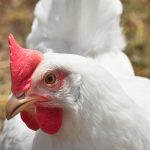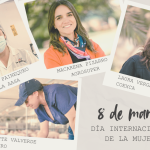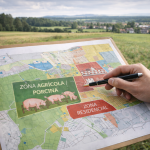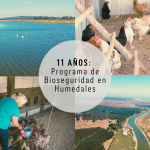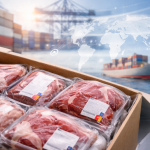Today, a key factor for countries’ progress and economic drive is determined by the social responsibility decisions made by companies around the world to have a positive impact on their communities. For decades now, Corporate Social Responsibility (CSR) has been understood as a philosophy that is part of the business’s vision, based on ethical values, care for the environment, and sustainability in general.
The Chilean white meat industry has also set itself apart by developing various socially responsible strategies, promoting solutions, measures, and actions that contribute to both the development of their surrounding communities and the mitigation of the impacts that, like any other industry, they themselves might have produced.
Entrepreneurship as part of Agrosuper’s DNA
In the last decades, Agrosuper has implemented various CSR actions alongside its neighboring communities. In 2020, the Entrepreneurial Capital program was launched, bringing together entrepreneurs from the towns of Mostazal, Graneros, and Doñihue (O’Higgins Region), who are provided with training, mentoring, and workshops to strengthen local businesses. In addition to local governments, program partners include La Semilla Foundation, Banigualdad Foundation, and AIEP (a technical education center), along with the Business Center of the Technical Cooperation Service (Sercotec) in the city of Rancagua (O’Higgins Region) that will offer courses to second-year entrepreneurs.
Rodrigo Torres, Agrosuper’s Deputy Manager of Community Relations, explains: “entrepreneurship is part of our DNA and that is why we want to keep supporting the growth and development of the 350 entrepreneurs who will join this program over the next three years. Agrosuper is proud and pleased to lead this collaborative effort that provides them with new tools to innovate and strengthen their projects.”
Sebastián Osorio, Sercotec’s Regional Director, talked more about the program: “We here at Sercotec work through the Business Center, an important part of our program. We want to provide a space to train, advise, and introduce concepts that entrepreneurs need to apply in their ventures. We want to have an economic impact, for them to thrive, increase their sales, and access new markets.”
AASA: committed to reducing GHG emissions
AASA has also made strides to advance the growth and progress of its neighboring communities, and stands out for its contribution to reducing GHG emissions. AASA agricultural company produces the equivalent of 5,200 kg. of urea per day, valued at 600 million CLP worth of fertilizers per year. Currently, over 800 neighboring hectares are fertigated. Regarding NCRE, 2,200 tons of CO2 emissions are reduced thanks to the electricity generation that covers 59% of the electricity consumed.
These measures led the company to join the HuellaChile (ChileFootprint) program in 2019, and to commit to measuring GHG emissions at El Campesino facility located in Melipilla (Metropolitan Region). The company was awarded the «Quantification” seal thanks to that effort.
AASA reports that its current investment in CSR programs amounts to 13 million CLP per year. Some of their activities include: the opening of the sixth recycling station in the municipality of San Esteban (Valparaíso Region); a magic show with school kids from Nancagua (O’Higgins Region) and Teno (Maule Region); waste removal from septic tanks in the neighborhood of Tierra Chilena (Nancagua, O’Higgins Region), and a successful campaign to deworm 3,000 dogs. Currently, AASA owns the first pig farm in the country to join HuellaChile.
Coexca, “a good neighbor and a supportive friend”
Coexca has two CSR programs related to education and access to water. Carlos Montoya, the company’s Corporate Affairs Director, explains that they work with two schools for educational purposes. “One is located in the municipality of Maule (Maule Region), close to our processing plant. Vulnerable and low-income children from Villa Francia and Villa Brisas del Maule attend this school. These children face difficulties getting to school, particularly in winter so we provide them with transportation throughout the year, driving them to school every morning and bringing them back home in the afternoon. Similarly, we organize various activities with the same school, such as providing awards for the best students at the end of each year as well as sports equipment for children to play sports like they should be able to. We have even provided interactive whiteboards,” Montoya explains.
The second school is located in Sauzal (Maule Region), where Coexca collaborates with parents, guardians, and the children. One of the activities is an annual field trip, where they bring people like concert musicians, for example, so that kids can learn more about other music genres. The company also collaborates with the school’s awards and improvements to the kitchen. A newspaper was also created in both schools to facilitate communication and bonding between students, parents, and teachers.
In terms of access to water, Montoya explains: “Sauzal, which is the closest town to our rearing farm in San Agustín, runs out of water during summer because of the drought that has hit Chile in recent years. We have provided wells and drilled wells for them to have a steady supply. It certainly has become an effective solution for the town because before they needed to use tanker trucks that transported water from the local government.”
Montoya explains that each home around the San Agustín facility receives 1,000 liters of water per week throughout the year, so they can have water for their daily lives.
These initiatives were first implemented three years ago as part of a long-term continuous program included on Coexca’s CSR strategy. “We do it with the utmost care, collaborating with communities so we can be a good neighbor and a supportive friend,” he says.
And added: “we are considering helping with garbage collection in the near future, particularly in the San Agustín farm, and in other farms we have already contributed water tanks for the neighbors as well as aerial spraying to help reduce flies in homes.”
Maxagro, focused on the social reintegration of vulnerable teens and young girls
Maxagro and the aforementioned companies consider communities an essential stakeholder in their daily work. Rolando Rojas, Maxagro’s HR Manager, believes a free and direct contact with people around their operations is key, as well as knowing the reality of the communities to help them meet some of their needs.
As part of this commitment, Maxagro and «Together for Children» have signed a partnership with a foster home in San Vicente de Tagua (O’Higgins Region) and another in Chillán (Ñuble Region) to support vulnerable girls and teens. This is a significant task for our team, as it not only helps to maintain the facilities and what they need for their work, but Maxagro workers also visit the homes regularly to spend time with the residents. “This volunteer work is important for our workers because it is such a significant experience that allows them to help out with empathy, spending time with and listening to the teens and young girls who have gone through difficult situations and who need support and encouragement to believe in themselves and their potential. It fills us with joy to be able to share with them and do our part for the social reintegration of these teens and young girls,” explains Rolando Rojas.
As part of this work, volunteers have been advised and trained by the Padre Semería Foundation –in charge of the home in San Vicente– to better understand the challenges faced by foster kids and provide them with the right tools to help them and communicate effectively.

